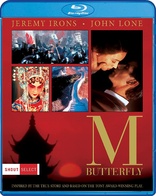M. Butterfly Blu-ray Movie
HomeM. Butterfly Blu-ray Movie 
Shout Factory | 1993 | 101 min | Rated R | Nov 16, 2021Movie rating
6.8 | / 10 |
Blu-ray rating
| Users | 0.0 | |
| Reviewer | 3.5 | |
| Overall | 3.5 |
Overview
M. Butterfly (1993)
In 1960s China, French diplomat Rene Gallimard falls in love with an opera singer, Song Liling - but Song is not at all who Gallimard thinks.
Starring: Jeremy Irons, John Lone, Barbara Sukowa, Ian Richardson, Shizuko HoshiDirector: David Cronenberg
| Drama | 100% |
Specifications
Video
Video codec: MPEG-4 AVC
Video resolution: 1080p
Aspect ratio: 1.85:1
Original aspect ratio: 1.85:1
Audio
English: DTS-HD Master Audio 2.0 (48kHz, 24-bit)
1648 kbps
Subtitles
English SDH
Discs
Blu-ray Disc
Single disc (1 BD)
Playback
Region A (C untested)
Review
Rating summary
| Movie | 3.5 | |
| Video | 4.0 | |
| Audio | 4.0 | |
| Extras | 2.0 | |
| Overall | 3.5 |
M. Butterfly Blu-ray Movie Review
Reviewed by Dr. Stephen Larson January 18, 2022David Henry Hwang's 1988 play M. Butterfly enjoyed an extended run on Broadway at the Eugene O'Neill Theatre where it received 777 performances. It won three Tony Awards and was performed in more than thirty countries. After directing Naked Lunch (1991), David Cronenberg was searching for a new film project that would receive studio funding but at the same time, not be considered too mainstream. He saw ads and reviews for M. Butterfly in the newspapers, read Hwang's play, and looked to develop it into a movie. He connected with David Geffen who, according to Michael Rechtshaffen of the Financial Post, first interviewed Peter Weir and Stephen Frears for the directing gig. Both passed so Cronenberg made his pitch and was pleasantly surprised that Geffen bought it. The Philadelphia Inquirer's Carrie Rickey reported that Geffen and Warner Bros. both sought Jeremy Irons to play the lead part of French diplomat René Gallimard. Cronenberg was ecstatic since he didn't envision any other actor in the role. The movie reunited Cronenberg and Irons five years after they collaborated on Dead Ringers (1988). Irons doesn't typically get along with the directors he works with but this is an exception. It's also the only time up to this point where he's worked with the same director twice. My research indicates that Geffen, who financially backed Hwang's play, left Cronenberg alone to do what he wished and didn't see any of M. Butterfly until the final cut. This was Cronenberg's second studio picture and the first time he's filmed outside of Canada.
After M. Butterfly was completed, Cronenberg's home country fêted the auteur in the autumn of 1993. It honored him with David Cronenberg Day, although the Toronto filmmaker didn't get the key to the city. M. Butterfly opened the 18th annual Toronto International Film Festival of Festivals at the Elgin Theatre which housed about 3,000 attendees, including Cronenberg as well as Irons and John Lone. Jane Stevenson of The Canadian Press reported that then-Canadian Prime Minister Kim Campbell also attended, a first for a PM. Audience reception was apparently favorable, though local reviews by critics were mixed. This was a big year at TIFF with 299 movies from 46 countries. Around that time, the Royal Ontario Museum hosted “Strange Objects of David Cronenberg’s Desires,” an exhibition featuring storyboards, props, and special effects from several of Cronenberg's films.
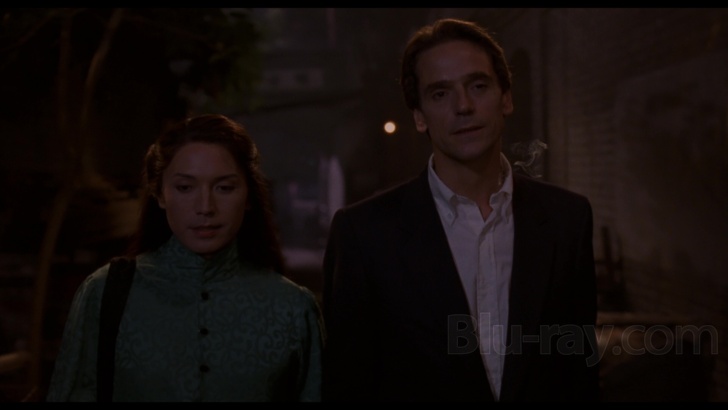
Song and René take a stroll.
I've read Hwang's play and can comment on some of the differences it has with the movie, which Hwang also wrote. In the stage version, the narrative is told in flashbacks with Gallimard recounting earlier events from Paris ca. 1986. For the film, Cronenberg had Hwang tell the story in chronological order. In the play, events occur primarily from 1961–63 while in the film, Hwang moves them up to 1964. This change suggests a choice to compress events into a shorter span. I believe Hwang and Cronenberg also did this to indicate America's burgeoning involvement in Vietnam by 1964. The play gives greater coverage of this than the film.
The plot of both works revolves around French bureaucrat René Gallimard (John Lithgow in the play; Jeremy Irons in the film) attending a Beijing Opera performance of Puccini's Madama Butterfly. Gallimard is mesmerized by opera diva Song Liling, who he visits after the curtain closes. Gallimard is taken by Song's beauty and expressivity. Song gives him the truth that Madama Butterfly is only appreciated and liked by Westerners because it features a beautiful and submissive Asian woman who's conquered by a cruel white man. Gallimard tries all he can to circumvent that stereotype but Song sees through him. Still, Gallimard and Song remain interested and attracted to each other with the former visiting the latter in secret. Song is a welcome escape for Gallimard, who's bored in his accounting job tracking expenses for French intelligence. He's also wholly unhappy in his marriage to wife Jeanne Gallimard (Barbara Sukowa). The couple attend parties together in Beijing but he's always the one returning late to their hotel. Gallimard believes he's receiving a good education about Chinese culture and customs from Song. His ever-growing knowledge impresses the ambassador (Ian Richardson) enough to promote him to vice consul. Gallimard begins passing information about American troop movements in Vietnam to Song, whom he doesn't know is a spy.
Cronenberg made a creative decision to bypass the play's serio-comedic commentary on culture and gender identity to instead make it a passion play between Gallimard and Song. The problem is that Irons isn't up to the task. He vows that he truly loves his Butterfly (as he calls Song) but there aren't really any passionate moments between the two. Gallimard respects Song's wish not to unclothe but when there are hints of eroticism, he's doesn't passionately pursue the opera star. For those who haven't seen M. Butterfly, I'll refrain from specifying Song Liling's true gender.
M. Butterfly Blu-ray Movie, Video Quality 
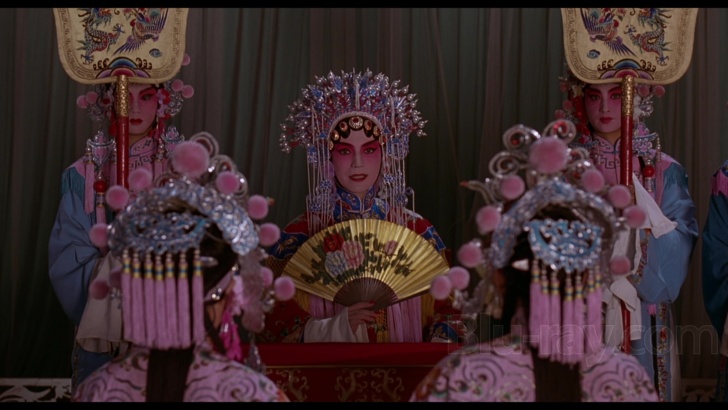
Shout Select has released M. Butterfly on an MPEG-4 AVC-encoded BD-50 (#125 in the boutique label's catalog). The film appears in its original theatrical aspect ratio of 1.85:1. I own the 2009 Warner DVD, which opened the image up to 1.78:1. Shout's transfer is apparently taken from a newer master, which has received a 2K scan. The print is quite clean with healthy grain and print artifacts low in number. Peter Suschitzky's cinematography is often lit at night with a minimum of source light, which you'll notice in several of the screenshots. The beautifully staged scenes of the Beijing Opera contain primarily pink and light blue (see frame grabs 2 and 14). Contrast that with the lighting and colors in a performance by the Red Guard during Mao's revolution (#9). The Austin Chronicle's Marc Savlov observed, after apparently seeing a theatrical print, that the palette is dominated by dark ambers, reds and blues. This is often the case on this transfer.
The main titles (e.g., Screenshot #20) were designed by Michael Arias's computer graphics firm, Syzygy Digital Cinema. Liza Hyde Screens also contributed to the design. The Asian artifacts that float during the titles are taken from Christie's New York and the Detroit Institute of Arts.
Shout has encoded the feature at an average video bitrate of 36000 kbps. The 101-minute feature receives a dozen scene selections.
M. Butterfly Blu-ray Movie, Audio Quality 
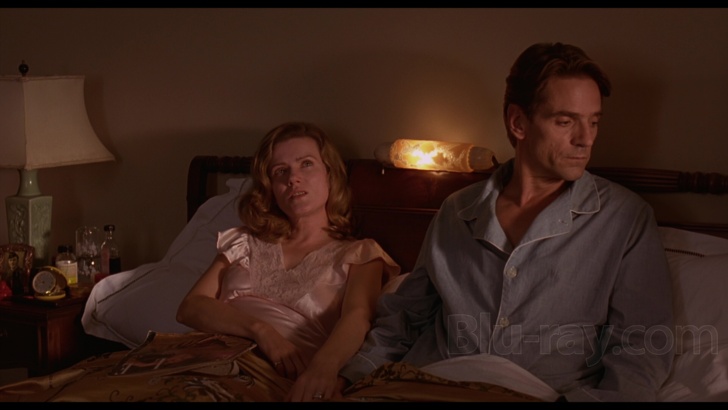
Shout has supplied a DTS-HD Master Audio 2.0 Stereo track (1648 kbps, 24-bit), which is the movie's original audio mix. The regular dialogue is in English while the opera performances are delivered in Mandarin and French. Some of the dialogue is registered low and uttered in a whispered fashion (especially early in the film) so it may be handy to switch on the optional English SDH. Cronenberg's longtime collaborator Howard Shore wrote an original orchestral score inspired in part by Puccini's opera. The main theme has a grand opening with rising brass chords that give way to light strings and a lovely flute. The Beijing Opera arias and background instrumentation remind of the Peking Opera songs performed in Farewell My Concubine, which was also released in 1993.
M. Butterfly Blu-ray Movie, Special Features and Extras 

- NEW Audio Commentary by William Beard - The author of The Artist as Monster: The Cinema of David Cronenberg delivers an informative commentary on the thematic and cultural themes of M. Butterfly. It's not too highbrow so it should be accessible to even the most casual cinephile. In English, not subtitled.
- Interview with Director David Cronenberg (15:58, upconverted to 1080i) - Laurent Bouzereau conducted this interview with the director for the 2009 Warner Bros. DVD of M. Butterfly. Cronenberg remembers how the M. Butterfly logo in newspaper ads for the play made an impression on him. He also talks about why he was intrigued to make it into a film, his pitch to David Geffen for why he wanted to direct an adaptation, and his casting of Jeremy Irons and John Lone. Cronenberg also speaks about his specific approach to the project, how M. Butterfly was designed for audiences, and its reception. He additionally talks about filming in Beijing, Toronto, Budapest, and Paris. A great interview that one wishes was longer. In English, not subtitled.
- Theatrical Trailer (2:02, upconverted to 1080i) - an analog-sourced original trailer for M. Butterfly presented in 1.33:1. It uses the MPEG-2 codec and is accompanied with Dolby Digital 2.0 Stereo (192 kbps).
M. Butterfly Blu-ray Movie, Overall Score and Recommendation 
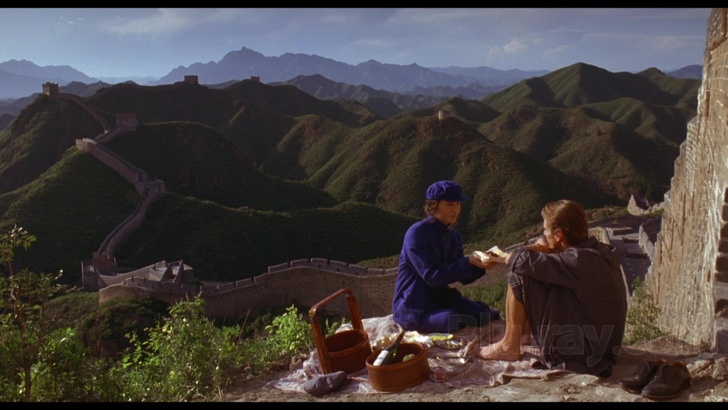
M. Butterfly boasts the most majestic cinematography in David Cronenberg's long career along with beautiful wardrobes designed by his sister Denise. While the movie succeeds on aesthetic levels, it's less successful with its elliptical narrative and relative lack of character engagement. Jeremy Irons excels as the French diplomat but falters as a romantic partner to Song Liling. Irons essentially played a similar character a year earlier in Louis Malle's superior Damage. Shout Select delivers a very fine transfer and an above-average stereo sound track. Shout has brought over the 2009 interview with Cronenberg from the Warner DVD and added another terrific feature-length commentary by Cronenberg scholar William Beard, who also recorded one for Shout's The Fly (1986) disc. RECOMMENDED to fans of Cronenberg and Irons.
Similar titles
Similar titles you might also like

La Chinoise
1967

Masculin Féminin
1966

Sarah's Key
Elle s'appelait Sarah
2010

Mandabi
1968

Out 1
Out 1, noli me tangere
1971

Touki Bouki
1973

The Image Book
Le livre d'image
2018

The Two of Us
Le vieil homme et l'enfant | 50th Anniversary Edition
1967

Boat People
投奔怒海 / Tau ban no hoi
1982

The Fire Within
Le feu follet
1963

Café de Flore
2011

Greetings
1968

The Night of the Following Day
1969

Les Miserables
I miserabili
1934

Saint Laurent
2014

Topaz 4K
1969

Jules and Jim
Jules et Jim
1962

The Conformist
Il Conformista | 4K Restoration
1970

Summer Hours
L'heure d'été
2008

La Marseillaise
The Marseillaise
1938
